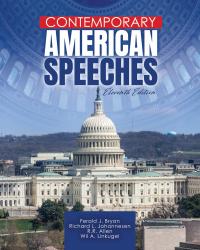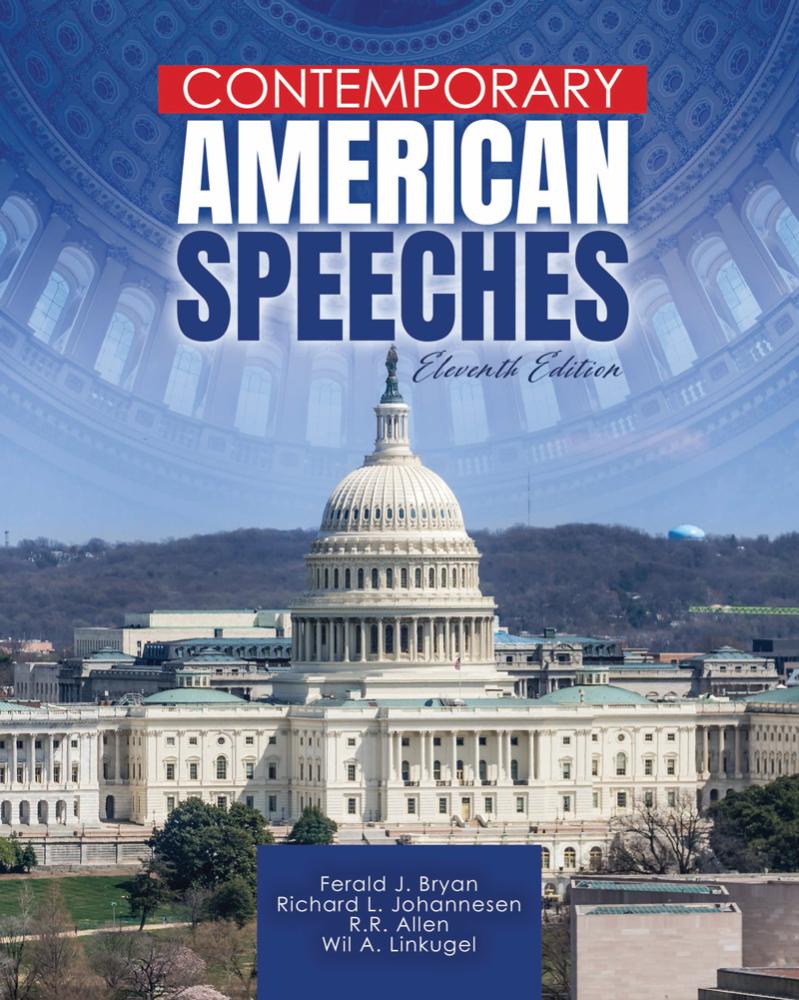Contemporary American Speeches
Author(s): Ferald J Bryan , Richard L Johannesen , Ron Allen , Wilmer A Linkugel
Edition: 11
Copyright: 2022
Pages: 204
Choose Your Platform | Help Me Choose
New Eleventh Edition Now Available!
Set to be released in a new eleventh edition, Contemporary American Speeches serves as a core textbook in courses such as Contemporary Public Address, Rhetorical criticism, and Contemporary Speakers and Speeches. The publication integrates 27 speeches by well-known speakers that typify current public scrutiny of some of society’s most pressing questions.
Continuing the diversity of different “voices”, the new eleventh edition of Contemporary American Speeches:
- includes new speeches based on suggestions from users of previous editions and the authors’ teaching experience, as they selected addresses that generated student discussion and insight.
- presents speeches from 1960 to the present with primary emphasis on the first two decades of the twenty-first century.
- integrates introductory headnotes that proceed each speech. These headnotes provide background information and pose questions to aid in evaluation.
- has been updated! Each chapter essays develops criteria useful in exploring and evaluating the various forms of public speaking. It features a robust section on diverse public speaking traditions as influenced by culture and gender, important additions on narration as a rhetorical technique, and a new section on “Civility in Public Discourse.”
Chapter One: Why Study Speeches?
To Increase Our Knowledge of Humanity
To Derive Standards for the Critical Appraisal of Public Discourse
To Enlarge and Deepen Our Understanding of Rhetorical Theory
To Develop an Appreciation for Excellence in Public Address
To Broaden Our Understanding of Diverse Public speaking Traditions within Our Society
Chapter Two: The Analysis of Speeches
The Art of Rhetoric
The Forms of Speeches
Some Guidelines for the Analysis of Speeches
Civility in Public Discourse
Chapter Three: Speeches That Increase Understanding
Nature and Importance
Criteria for Evaluating
Julia Hughes Jones, “The Secret History of Women.”
Elizabeth Warren, “Pocahontas’s Real Journey.”
Eric McLuhan, “Literacy in a New Key.”
Chapter Four: Speeches that Affirm Propositions of Fact
Mature and Importance
Criteria for Evaluating
Patrice Harris, “COVID-19: The Importance of Science in an Era of Distrust and Disinformation”
Stephen M. Hahn, “Remarks to the National Academy of Medicine Town Hall on the COVID-19 Vaccine”
Al Gore, “An Inconvenient Truth.”
Sally Mason, “The Gender Gap in Technology.”
Chapter Five: Speeches That Affirm Propositions of Value
Anthony Fauci, “Commencement Address At American University.”
Bill Clinton, “Three Speeches of Apology.”
George H.W. Bush, “A Just War.”
Chapter Six: Speeches That Create Concern for Problems
Nature and Importance
Criteria for Evaluating
Rafael Warnock, “Maiden Speech.”
Alexandria Ocasio Cortez, “I Am Also Someone’s Daughter.”
Mary Fisher, “Address on AIDS to the 1992 Republican Convention.”
Chapter Seven: Speeches That Affirm Propositions of Policy
Nature and Importance
Criteria for Evaluating
Elizabeth Warren, “A Crisis of Faith.”
Hillary Clinton, “Women’s Progress is Human Progress.”
Bruce Castor, “Closing Arguments: Second Trump Impeachment Trial.”
Jamie Raskin, “Closing Arguments: Second Trump Impeachment Trial.”
Chapter Eight: Speeches That Intensify Social Cohesion
Nature and Importance
Criteria for Evaluating
John Kennedy, “Inaugural Address.”
Joseph Biden, “Inaugural Address.”
Kim Janey, “Inaugural Address.”
Barbara Jordan, “1976 Democratic Convention Keynote Address.”
Kamala Harris, “Democratic Convention Vice-Presidential Nomination Acceptance Address.”
John Lewis, “50th Anniversary of the March on Washington.”
Douglas MacArthur, “Farewell to the Cadets.”
Ronald Reagan, “Eulogies for the ‘Challenger’ Astronauts.”
Barack Obama, “Address at the Sandy Hook Vigil.”
Barack Obama, “Farewell to Staff.”
New Eleventh Edition Now Available!
Set to be released in a new eleventh edition, Contemporary American Speeches serves as a core textbook in courses such as Contemporary Public Address, Rhetorical criticism, and Contemporary Speakers and Speeches. The publication integrates 27 speeches by well-known speakers that typify current public scrutiny of some of society’s most pressing questions.
Continuing the diversity of different “voices”, the new eleventh edition of Contemporary American Speeches:
- includes new speeches based on suggestions from users of previous editions and the authors’ teaching experience, as they selected addresses that generated student discussion and insight.
- presents speeches from 1960 to the present with primary emphasis on the first two decades of the twenty-first century.
- integrates introductory headnotes that proceed each speech. These headnotes provide background information and pose questions to aid in evaluation.
- has been updated! Each chapter essays develops criteria useful in exploring and evaluating the various forms of public speaking. It features a robust section on diverse public speaking traditions as influenced by culture and gender, important additions on narration as a rhetorical technique, and a new section on “Civility in Public Discourse.”
Chapter One: Why Study Speeches?
To Increase Our Knowledge of Humanity
To Derive Standards for the Critical Appraisal of Public Discourse
To Enlarge and Deepen Our Understanding of Rhetorical Theory
To Develop an Appreciation for Excellence in Public Address
To Broaden Our Understanding of Diverse Public speaking Traditions within Our Society
Chapter Two: The Analysis of Speeches
The Art of Rhetoric
The Forms of Speeches
Some Guidelines for the Analysis of Speeches
Civility in Public Discourse
Chapter Three: Speeches That Increase Understanding
Nature and Importance
Criteria for Evaluating
Julia Hughes Jones, “The Secret History of Women.”
Elizabeth Warren, “Pocahontas’s Real Journey.”
Eric McLuhan, “Literacy in a New Key.”
Chapter Four: Speeches that Affirm Propositions of Fact
Mature and Importance
Criteria for Evaluating
Patrice Harris, “COVID-19: The Importance of Science in an Era of Distrust and Disinformation”
Stephen M. Hahn, “Remarks to the National Academy of Medicine Town Hall on the COVID-19 Vaccine”
Al Gore, “An Inconvenient Truth.”
Sally Mason, “The Gender Gap in Technology.”
Chapter Five: Speeches That Affirm Propositions of Value
Anthony Fauci, “Commencement Address At American University.”
Bill Clinton, “Three Speeches of Apology.”
George H.W. Bush, “A Just War.”
Chapter Six: Speeches That Create Concern for Problems
Nature and Importance
Criteria for Evaluating
Rafael Warnock, “Maiden Speech.”
Alexandria Ocasio Cortez, “I Am Also Someone’s Daughter.”
Mary Fisher, “Address on AIDS to the 1992 Republican Convention.”
Chapter Seven: Speeches That Affirm Propositions of Policy
Nature and Importance
Criteria for Evaluating
Elizabeth Warren, “A Crisis of Faith.”
Hillary Clinton, “Women’s Progress is Human Progress.”
Bruce Castor, “Closing Arguments: Second Trump Impeachment Trial.”
Jamie Raskin, “Closing Arguments: Second Trump Impeachment Trial.”
Chapter Eight: Speeches That Intensify Social Cohesion
Nature and Importance
Criteria for Evaluating
John Kennedy, “Inaugural Address.”
Joseph Biden, “Inaugural Address.”
Kim Janey, “Inaugural Address.”
Barbara Jordan, “1976 Democratic Convention Keynote Address.”
Kamala Harris, “Democratic Convention Vice-Presidential Nomination Acceptance Address.”
John Lewis, “50th Anniversary of the March on Washington.”
Douglas MacArthur, “Farewell to the Cadets.”
Ronald Reagan, “Eulogies for the ‘Challenger’ Astronauts.”
Barack Obama, “Address at the Sandy Hook Vigil.”
Barack Obama, “Farewell to Staff.”



